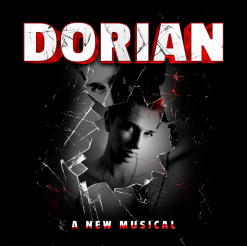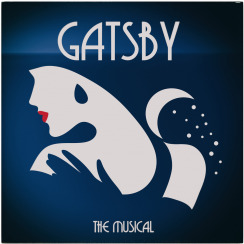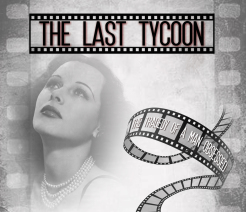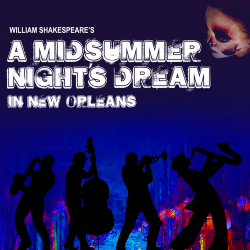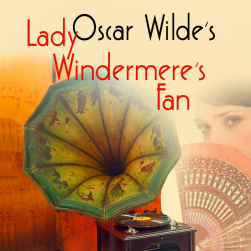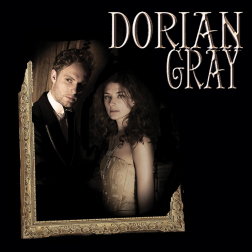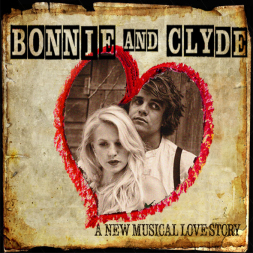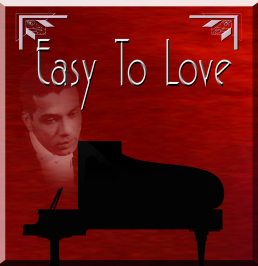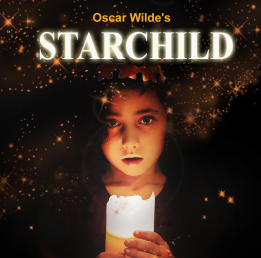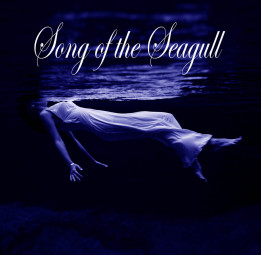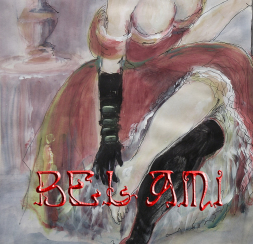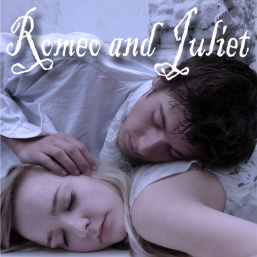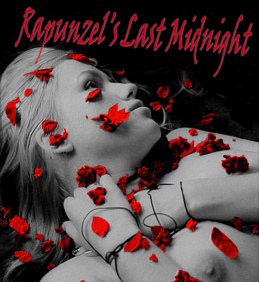
FOR INFORMATION ABOUT LICENSING ANY OF OUR PRODUCTIONS - PLEASE CONTACT:
email@rubyinthedusttheatre.london
OR COMPLETE THE FORM ON THE CONTACT PAGE:
Titles avaiable for licence include
Gatsby, Dorian Gray, Easy To Love, Bonnie and Clyde, Starchild, Song of the Seagull, Bel Ami and Rapunzel's Last Midnight.
inspired by Oscar Wilde's "The Picture of Dorian Gray"
“Who am I, really?”
“What is love?”
Dorian Gray, the secret child of love and death is suddenly thrust into a confusing world. A world where love dare not speak its name, yet everybody is searching for it
On his search Dorian comes across the many mirrors of his soul. The dangerous and charismatic Lord Henry casts him into a hedonistic lifestyle’ Sibyl Vane sees him as the Romantic lead and Lady Henry merely wants to prey on him. But it is the gentle society painter, Basil Hallward, who shows him as he truly is.
On his quest to find his true identity, Dorian must decide if it is better to be loved or to be feared. When Dorian realises the painting is, in fact, a portrait of his conscience, he is horrified to see the level of corruption depicted on the canvas and decides to try to reverse time.
“I would give anything for that – I would give my soul!”
But is it too late?
Inspired by Oscar Wilde’s classic novel, “The Picture of Dorian Gray”, ‘DORIAN’ is set in a fantasy world, revealing both sides of Dorian Gray’s tragic life: the real one and the portrait.
An Unconventional Musical about Unconventional People
inspired by F Scott Fitzgerald’s classic novel.
The Jazz Age is in full swing and, two years after the events of the book, a haunted Meyer Wolfshiem is forced down memory lane by a mysterious young woman asking after Gatsby.
The year is 1925. New York is under the siege of Prohibition, and Speakeasy’s are the place to be, and to be seen. Except for Meyer Wolfshiem’s ‘Luna Park’, which has been shut down for two years after he received the “biggest shock of his life”. When he finally opens the doors again - a young woman walks in asking after “Gatsby”. What secrets are stirred as she is forced to confront the past she’s been trying to escape?
The Last Tycoon
The tragedy of a man obsessed…
“He has the power to make anyone’s dreams come true… except his own.”
F. Scott Fitzgerald’s novel is brought to life in this story of a movie producer slowly working his way to death in a world darkened by the Depression and the rising passion of the screen-writers’ unions.
Monroe Stahr, the “Boy Wonder” is a man obsessed: with movies, with illusion, with the memory of his dead wife and with Shakespeare. When an earthquake nearly destroys the studio, an enigmatic and mysterious Englishwoman steps out of the wreckage.
Is she the one to save Stahr? Or will his latest obsession finally destroy him?
Like the titular hero of the novel, F Scott Fitzgerald died before he completed his masterly study of Hollywood in its heyday. It is his final, poignant farewell to the Great American Dream – a bittersweet love affair set in a never-never land: 1930s – The Golden Age of Holloywood.
Fitzgerald modelled Monroe Stahr on the historic film producer, Irving Thalberg. The story follows Stahr's rise to power in Hollywood, and his conflicts with rival Pat Brady (based on prominent studio head Louis B. Mayer) – a man desperate to kill Monroe’s dreams… and even Monroe himself!
With music from the period and a mixture of period and original film footage, this tale evokes the nostalgia of a lost age and lost dreams. A journey into the literal and metaphorical heart of a great man.
A Midsummer Night’s Dream – In New Orleans
The magic of Shakespeare's A Midsummer Night's Dream is transported to the spell-casting city of New Orleans at the turn of the 20th century.
Set in the city that gave birth to jazz, the story begins in the rundown New Orleans jazz clubs and winds its way into the dark, moody mystery of the Louisiana bayous. Audiences who expect to hear the sound of the lute for musical accompaniment will be intrigued to listen to the jazz of Dr. John, who gave his approval for its inclusion, in this production. In addition to the music of Dr. John, the musical includes the songs of Louis Armstrong and Professor Longhair, as well as Randy Newman’s Oscar-nominated song from Disney’s The Princess and the Frog, "Down in New Orleans". Oberon and Titania are “The Night Tripper” and the Voodoo Queen, and the “Mechanicals” form one of the earliest of the jazz bands. And can you imagine Puck set loose in the city where there’s practically a city ordinance requiring the making of mischief? The “play within a play” becomes a Mardi Gras jam session, and those members of the audience who are so moved, and so able, are invited to bring their instruments to jam with the cast after the shows
Lady Windermere's Fan
Updated to the 1930s against a backdrop of the popular music of the time.
LADY WINDERMERE’S FAN was OSCAR WILDE’S first masterpiece and made him an overnight success when it premiered in London in 1892.
Young, rich, beautiful and happily married, Lady Windermere has it all. Until her husband invites a mysterious widow to her 21st birthday ball. Who is she? Why is she there? What is their secret?
Suddenly everything that Lady Windermere holds dear is in jeopardy. Nothing is as it seems in this satirical thriller, full of intrigue, jealousy, scandal and Oscar Wilde’s famous, inimitable one-liners.
Dorian Gray
Set in the last few delirious hours of his life, Dorian Gray watches as his decadent life flashes before him. What he glimpses is a far cry from the opera houses, the salons and the gentlemen’s clubs. Join him as he delves into the darker, murkier underbelly of London: the cabaret clubs and opium dens, where sex and death share the same bed. And where love dare not speak its name. Descend into his world - the real picture of Dorian Gray – beneath his youthful mask: The Extraordinary Cabaret of Dorian Gray.
Adapted from Oscar Wilde’s only novel, tracing the life of one of literature’s most notorious characters, the tale reveals each character’s quest for the ultimate sensation!
With original music.
Bonnie and Clyde
“...We ain't headin' nowhere, we're just runnin'...“
The tale of America’s most famous and glamorous bank robbers, this new play with music charts the poverty, infatuation and tragedy of the two young criminals who became folk legends.
As America is ravaged by the Great Depression, are these love-struck outlaws cold-blooded murderers or the ultimate rebels against an unjust system? Decide for yourself with this heady musical cocktail of violence, celebrity and true love.
Bonnie and Clyde charts a true tale of love, poverty, criminality and celebrity set in the 1930s Southern States of drought, dust, disease and death.
When Bonnie met Clyde it was an instant and dangerous attraction. From an impoverished, crime- riddled childhood, these two young lovers became inseparable and quickly plunged themselves into a life of fast cars, guns, revenge ... and Hell. Part folk heroes and part murderous outlaws, Bonnie and Clyde instantly became the stuff of legend.
“...Bonnie and Clyde don’t know that killing kills. The newspapers know that killing sells...”
Exploring the intricate relationships of the infamous ‘Barrow Gang’, this stage adaptation, fused with music and featuring original vintage film footage, follows the couple’s cat-and-mouse game with the law across the arid plains of the Depression-riddled dust-bowl and through to its inevitable and tragic conclusion.
Easy To Love
“Lady Mountbatten sues over claims of an affair with black singer” ran British newspaper headlines in July 1932.
But the truth was even more scandalous...
Originally titled “Hutch”, Easy To Love, is a story of illicit love, racism and betrayal at the highest levels of British society. The unforgettable music and lyrics of Cole Porter feature heavily in the play about Leslie ‘Hutch’ Hutchinson, London’s most popular cabaret attraction of the 20s and 30s.
“I was lucky to be in Paris at the time Cole Porter was starting to write his big hits... He
taught me how to sing his songs and introduced me to the right people.” – Hutch
The ‘right people’ (aka his numerous lovers) included Hollywood stars, debutantes, princesses and duchesses; most famously Edwina, wife of Lord Louis Mountbatten, the Queen’s cousin. But the love triangle of Hutch, Porter and Mountbatten ultimately destroyed him, emotionally, physically and musically.
Hutch was born in Grenada in 1900, moving to New York in his teens, then Paris and London in 1927 where the jazz age was in full swing. He was soon the darling of society and the population in general. Hutch was a favourite singer of the then Prince of Wales (later King Edward VIII) and he had an audience of millions as a performer on BBC radio. As well as being the lover of Cole Porter, Hutch recorded several of his songs, including Begin the Beguine and Porter's famous list song Let's Do It (Let's Fall in Love), to which Hutch made up 70 new verses. Hutch suffered from ill-health in his later years and died in London from pneumonia on 19 August 1969. Only 42 people attended his funeral.
Adapted from the biography, Hutch, by Charlotte Breese who is the author of the only biography of Hutch in existence and is a friend of Hutch's family.
Starchild
Oscar Wilde’s classical tale brought to life with original music in a compelling story with dance and a twist of magic.
A star falls from a winter sky and is found by two woodcutters. The star turns out to be a “STARCHILD” who grows up to be beautiful and beguiles everyone with his singing and dancing. But STARCHILD has a dark secret. Follow STARCHILD on his quest and meet, along the way, the proud Peacock, the sinister Wolf, the Hare that carries a message. And the Mystical Sorcerer....
Oscar Wilde told this story to his own children and included it in his collection A House of Pomegranates. STARCHILD has the echoes of Wilde’s famous novel Dorian Gray. Starchildren are children who have been sent to the earth from some where in the universe to help the earth and the people in it.
“…these stories are meant partly for children and partly for those who have kept their childlike faculties of wonder and joy, and who find in simplicity a subtle strangeness.”
Oscar Wilde
Song of the Seagull
A musical drama based on and inspired by the young Anton Chekhov and his play The Seagull
As Russia’s “brightest young stars” gather on the banks of the Volga one sultry summer’s evening in 1886, the death of a seagull changes all of their lives forever.
Young Anton Pavlovich Chekhov, surrounded by Bohemian artists, writers and musicians, is lured away from the medical profession and begins to take his writing seriously. But his involvement with a young gypsy singer, and his relationship with landscape artist Isaac Levitan lead to a life-changing painting excursion to the Volga. Tragedy and disillusion inevitably follow the young, impetuous passion.
Based on real events and real characters, the fictional musical drama Song of the Seagull, the extraordinary events of that summer will eventually shape Chekov’s most famous writing - The Seagull. As his friends pull him in different directions, his loyalties are torn. Isaac Levitan, the renowned landscape painter whose letters to and from Chekhov were destroyed at his request, shares Chekhov’s passion for nature and enjoyment of dirty jokes. But he is later dismayed to find himself in one of Chekhov’s stories, and considers this a gross betrayal. Vera Kommisarevskaya - the first actress to play Nina in The Seagull and mentor of Stanislavski - is desperate to be immortalised in a play and intermittently tells Chekhov deep secrets about herself; of her grief when her brother Grisha drowned and of her anguished mother wailing in the cherry orchard; her sexual betrayal by her husband which caused her deep hurt; anecdotes which inspire character back stories for The Cherry Orchard and The Seagull. Vasily Kalinnikov, a friend of Tchaikovsky and ground breaking composer, provides inspiration for the music of the piece. When Isaac shoots a seagull, events begin to escalate towards a tragic conclusion.
Tragically, along with Chekhov himself, all of these artists are destined to die young at the height of their fame. But their quest for “immortality” has been realised in their respective achievements.
Bel Ami
Adapted from Guy de Maupassant’s novel, Bel Ami, explores the extremes of splendour and squalor, life and death.
Newly arrived in Paris, penniless, impressionable Georges Du Roy is dazzled by the glamour and decadence of the “Belle Epoque”. Desperate to be a part of this society he secures a job with the corrupt and sleazy newspaper, “La Vie Francaise”, but quickly finds himself entangled in a complicated web of women, sex and blackmail.
Georges discovers that it is sex that can bring him what he desires.
Plumbing the depths of depravity and decadence, of rich grandeur and seedy despair, a shocking truth is revealed, which Georges uses to his own advantage; in a way that surprises even himself.
Bel Ami takes us from the vulgar thrilling ‘Folies Bergere’ to smart Parisian restaurants, squalid bedsits to the glittering glass and soft settees of artistic salons, capturing the shifting nuances of the Parisian Belle Epoque; all against the backdrop of political intrigue, filled with dance, music, eroticism and drama.
And the more life is celebrated, so there also runs the undercurrent of death.
Romeo and Juliet
In 1938, Mussolini passed the Race Laws forbidding Italians to marry Jews…
The young Romeo lives in fear under the impending shadow of Italy’s Fascist rule. Count Capulet, militant member of Mussolini’s secret police – the “Blackshirts” - finds his world under threat when his daughter, Juliet, is determined to defy the Race Laws.
Set on the eve of World War Two, it is dangerous yet atmospheric, provocative and sexy, and stripped down to the real essence of the tragic tale, adding a new twist to the classic tale of the “star-cross’d” lovers.
Rapunzel's Last Midnight
Do you really want your dreams to come true?
With echoes of the original Grimm tale, the story places “Rapunzel” in a jazz café at midnight, and delves into the dark side of people’s dreams. Where second chances don’t exist and vengeance prevails.
Johnny Midnight suffers from what he calls his “Midnight Disease”. He can't write without experiencing the subject matter first. Consequently his relationships suffer. He is introduced to Scarlotta, who further complicates matters, as she has her own hidden agenda. And is she even a singer...? Johnny's pregnant girlfriend, Ruby, doesn't think she is, and is justifiably wary of Scarlotta's intrusion into their life. With references to Rapunzel, Scarlotta is determined to live out her own fairytale.

